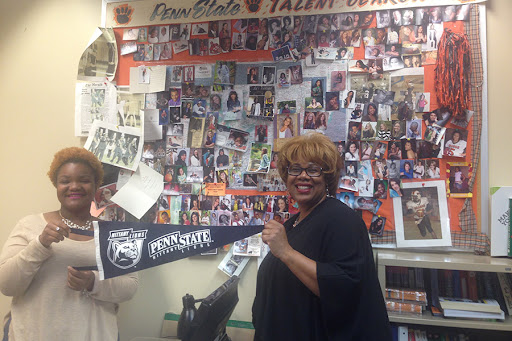
To sense the passion that Christal Graham-Jones has for her job as a Talent Search counselor, one only has to look at what she calls her “wall of fame” outside her office door at Sharon High School in Pennsylvania.
It is superimposed on a map of the U.S. and covered with dozens of pictures of the Talent Search students she has nurtured, taught, nudged, and cheered on during the course of her 11 years with the program, first as a volunteer, then as an employee. Some students are in football uniforms or holding basketballs; others are dressed to attend their proms; virtually all are smiling. By the look on their faces, it is clear that they all can see the same thing — their bright futures.
“When you are not aware of everything that goes into the process of preparing to go to and apply to college, it is very intimidating, I make myself available to parents as well as students. When the parents are knowledgeable, they will likely push their children to succeed even harder.”—Christal Graham-Jones
“Back in the day, we had steel mills, and people were guaranteed jobs. After the steel mills began to close, families were left wondering what to do. Well, that’s where education comes in,” Graham-Jones said.
She is one of nine Talent Search counselors who work for Penn State, said Stephen Holoviak. He is Penn State’s senior director for its three Talent Search projects and one Educational Opportunity Center project. The university is serious about reaching as many low-income, first-generation, and minority students as possible. Since 1992, Penn State has embedded all the Talent Search counselors full-time in the high schools they serve, assuring that they operate in or near the guidance counselors’ offices and become familiar with the students attending school.
The approach is expensive, but it is effective, Holoviak said. “If I assigned one counselor to five schools, I would save four salaries. But this way, the students get a more intensive level of services.” Penn State’s program annually helps prepare over 1,800 students for college.
“The way Penn State runs this program is absolutely the best way,” enthused Michael Calla, Sharon superintendent of schools. “In many cases, poorer kids don’t have a consistent adult presence in their life. Students build a rapport with and trust the Talent Search counselors. They become familiar faces. All the kids know Christal. The kids drop in to see her whenever they need her. She meets with them (and) with their families, too,” he said.
Talent Search makes high schools stronger, Calla said.
“Before joining Talent Search, many students wouldn’t even consider college. The program allows them to test the water. It gives them a non-threatening way to look at their future,” he said.
At least two-thirds of Talent Search students are from low-income families whose parents did not complete a college degree. These are students who are less likely to go to college without support. This is where Talent Search comes in.
“When you are not aware of everything that goes into the process of preparing to go to and apply to college, it is very intimidating,” Graham-Jones said. “I make myself available to parents as well as students. When the parents are knowledgeable, they will likely push their children to succeed even harder.” Graham-Jones starts to reach out to students as early as the 6th grade, talking to them about careers and going to college. “I think of it as putting the program in their hearts,” Graham-Jones said.
Junior Ta’Day Clay agrees. A National Honor Society member and one of eight children, she listened to Graham-Jones give a presentation about Talent Search in the 8th grade. “My dad and mom didn’t graduate high school, but my dad did go to culinary school,” Ta’Day said. “I figured it was time to get serious about school. I decided I would be the first [in her family] to graduate from college. Talent Search has motivated me to get where I want to go. It’s prepared me for life,” she said.
Ta’Day said Graham-Jones had escorted her and others in Talent Search on different trips and college visits. “Just exposure to different opportunities lets you know there is more out there than what you see,” she said. Ta’Day hopes to major in psychology at Penn State or Slippery Rock State.
Although Penn State has poured time and effort into its Talent Search program for 25 years, only about 10 percent of the students have chosen to attend the university over the years. “We are specifically prohibited from recruiting for Penn State, and the University has been very respectful of these limits,” Holoviak said. Holoviak noted that the point is to help students prepare for college — not just for Penn State.
And that it does.
“In 11 years I have been working the program, I’ve never turned away a student,” Graham-Jones said. “It is a public service, and I love working with young people. I love to see the students progress, and I want to assist them. This program allows me to do that,” she said.